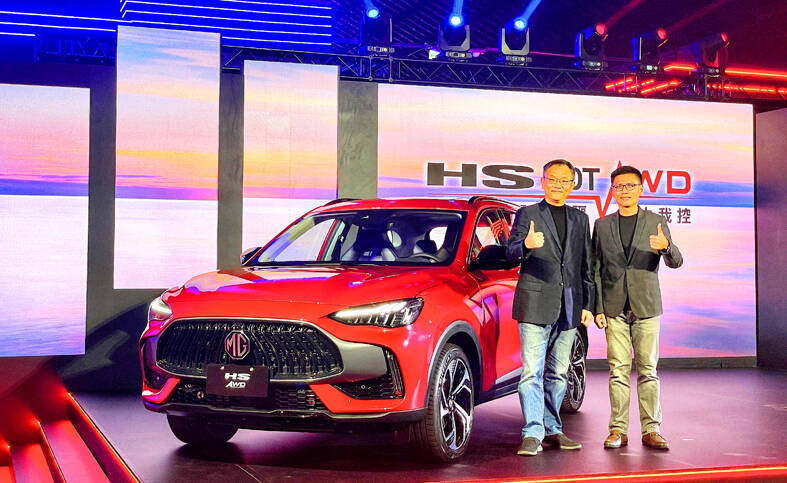To prevent Chinese auto parts from entering Taiwan in a piecemeal fashion, the Ministry of Economic Affairs (MOEA) has introduced a new policy on domestic vehicle assembly, which requires the proportion of local parts to rise progressively to 35 percent three years after their licensing.
MOEA Industrial Development Administration director Yang Chih-chin (楊志清) talked about the new measure during an interview on Thursday with the Liberty Times, the Taipei Times’ sister newspaper.
The new policy, which went into practice early this month, requires imported cars to increase their share of locally made parts to 20 percent in the first year of listing, 30 percent in the second year and 35 percent from the third year onward, Yang said.

Photo: Amy Yang, Taipei Times
The incremental design is intended to protect local autoparts suppliers from unfair competition by Chinese car companies that are reportedly dumping cars worldwide to resolve a severe supply glut, the official said.
The unfair trade practice has raised concern in Europe, the US and other markets whose authorities are drawing responsive measures and raising tariffs to level the playing field, he said.
The new policy is targeted at four kinds of automakers, namely pure Chinese car brands, cars from joint ventures with Chinese partners, car brands acquired by Chinese firms and foreign car brands that are manufactured in China, Yang said.
The introduction to the local market by China Motor Corp (中華汽車) of an MG HS sport utility vehicle from a Shanghai automaker has drawn the attention of lawmakers and has sped up the new policy, Yang said.
The Chinese automaker acquired the British car company MG, which changed owners several times over the past century.
The MG HS model ranked eighth-most popular in Taiwan by measure of new car sales, which spiked to an unprecedented 476,000 last year, as the market emerged from the COVID-19 pandemic, Yang said.
The ministry said it decided on the three-year buffer after factoring in practical considerations that some cars at issue have gone through their manufacturing and design stages, the official said.
The 35 percent cap would serve to protect Taiwanese auto part makers, while giving room for free competition, he said.
Taiwanese firms are competitive in making car bumpers, headlights, batteries and other electric components that have gained rising importance in electric vehicles, Yang said, adding that several companies collaborate closely with international car brands.
At the same time, the government has poured money into helping local firms upgrade their research-and-development capacities as well as technology and manufacturing processes, the official said.

DIVIDED VIEWS: Although the Fed agreed on holding rates steady, some officials see no rate cuts for this year, while 10 policymakers foresee two or more cuts There are a lot of unknowns about the outlook for the economy and interest rates, but US Federal Reserve Chair Jerome Powell signaled at least one thing seems certain: Higher prices are coming. Fed policymakers voted unanimously to hold interest rates steady at a range of 4.25 percent to 4.50 percent for a fourth straight meeting on Wednesday, as they await clarity on whether tariffs would leave a one-time or more lasting mark on inflation. Powell said it is still unclear how much of the bill would fall on the shoulders of consumers, but he expects to learn more about tariffs

NOT JUSTIFIED: The bank’s governor said there would only be a rate cut if inflation falls below 1.5% and economic conditions deteriorate, which have not been detected The central bank yesterday kept its key interest rates unchanged for a fifth consecutive quarter, aligning with market expectations, while slightly lowering its inflation outlook amid signs of cooling price pressures. The move came after the US Federal Reserve held rates steady overnight, despite pressure from US President Donald Trump to cut borrowing costs. Central bank board members unanimously voted to maintain the discount rate at 2 percent, the secured loan rate at 2.375 percent and the overnight lending rate at 4.25 percent. “We consider the policy decision appropriate, although it suggests tightening leaning after factoring in slackening inflation and stable GDP growth,”

Meta Platforms Inc offered US$100 million bonuses to OpenAI employees in an unsuccessful bid to poach the ChatGPT maker’s talent and strengthen its own generative artificial intelligence (AI) teams, OpenAI CEO Sam Altman has said. Facebook’s parent company — a competitor of OpenAI — also offered “giant” annual salaries exceeding US$100 million to OpenAI staffers, Altman said in an interview on the Uncapped with Jack Altman podcast released on Tuesday. “It is crazy,” Sam Altman told his brother Jack in the interview. “I’m really happy that at least so far none of our best people have decided to take them

PLANS: MSI is also planning to upgrade its service center in the Netherlands Micro-Star International Co (MSI, 微星) yesterday said it plans to set up a server assembly line at its Poland service center this year at the earliest. The computer and peripherals manufacturer expects that the new server assembly line would shorten transportation times in shipments to European countries, a company spokesperson told the Taipei Times by telephone. MSI manufactures motherboards, graphics cards, notebook computers, servers, optical storage devices and communication devices. The company operates plants in Taiwan and China, and runs a global network of service centers. The company is also considering upgrading its service center in the Netherlands into a